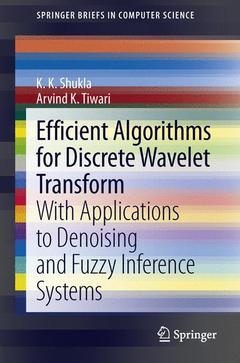Description
Efficient Algorithms for Discrete Wavelet Transform, 2013
With Applications to Denoising and Fuzzy Inference Systems
SpringerBriefs in Computer Science Series
Authors: Shukla K K, Tiwari Arvind K.
Language: English
Subjects for Efficient Algorithms for Discrete Wavelet Transform:
Publication date: 02-2013
91 p. · 15.5x23.5 cm · Paperback
91 p. · 15.5x23.5 cm · Paperback
Description
/li>Contents
/li>Comment
/li>
Due to its inherent time-scale locality characteristics, the discrete wavelet transform (DWT) has received considerable attention in signal/image processing. Wavelet transforms have excellent energy compaction characteristics and can provide perfect reconstruction. The shifting (translation) and scaling (dilation) are unique to wavelets. Orthogonality of wavelets with respect to dilations leads to multigrid representation. As the computation of DWT involves filtering, an efficient filtering process is essential in DWT hardware implementation. In the multistage DWT, coefficients are calculated recursively, and in addition to the wavelet decomposition stage, extra space is required to store the intermediate coefficients. Hence, the overall performance depends significantly on the precision of the intermediate DWT coefficients. This work presents new implementation techniques of DWT, that are efficient in terms of computation, storage, and with better signal-to-noise ratio in the reconstructed signal.
Introduction.- Filter Banks and DWT.- Finite Precision Error Modeling and Analysis.- PVM Implementation of DWT-Based Image Denoising.- DWT-Based Power Quality Classification.- Conclusions and Future Directions.
Describes a mathematical model to predict the errors introduced in the implementation of the discrete wavelet transform (DWT) on fixed-point processors Explores the application of DWT on benchmark signals and images in terms of denoising Proposes a modified threshold selection and thresholding scheme Includes supplementary material: sn.pub/extras
© 2024 LAVOISIER S.A.S.




